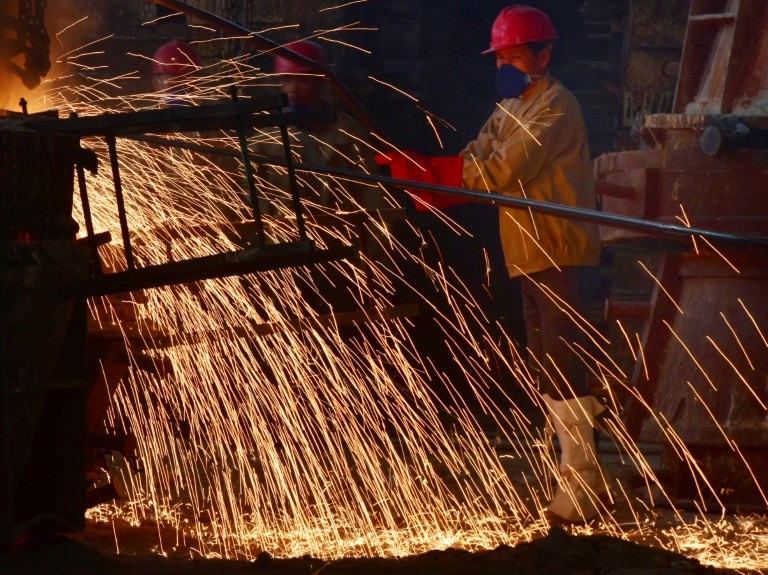Stock markets and oil prices went into freefall Monday as interest rate cuts and fresh stimulus measures by central banks failed to lift confidence.
The US Federal Reserve on Sunday slashed borrowing costs to almost zero — its second emergency cut in less than two weeks.
The US central bank also unveiled a massive asset-buying programme, similar to measures put into place during the global financial crisis more than a decade ago, and on Monday its NY branch unveiled another $500 bn in cash injections to boost liquidity.
The Bank of Japan joined in on Monday, saying it would ramp up its bond-buying programme.
In joint action coordinated with the European Central Bank, Bank of England, Bank of Japan, Bank of Canada and the Swiss National Bank, the Fed moved to counteract global “dollar funding pressures” according to its boss Jerome Powell.
But traders were unimpressed, and with the virus showing no sign of letting up, the head of the World Health Organization chief Tedros Adhanom Ghebreyesus said it was impossible to tell when it would peak globally.
Sydney’s stock market led losses in Asia-Pacific, tumbling 9.7 percent in its worst daily drop on record.
Shanghai shed 3.4 percent after the release the scale of the crisis was laid bare by data showing Chinese industrial production for January and February shrank 13.5 percent, the first contraction in around 30 years.
Tokyo ended 2.5 percent lower, after a rally sparked by the Bank of Japan’s support measures announcement fizzled.
Europe’s main markets were down around 10 percent as Wall Street opened to losses of similar magnitude that triggered automatic breaks in trading intended to halt panics.
“The aggressive rate cut and stimulus package form the Fed last night acted as a warning signal to the markets,” said CMC Market’s UK analyst David Madden.
“A large rate cut gives off the impression they –- the Fed, are nervous, and traders have picked up on that.”
Oanda analyst Craig Erlam told AFP: “Fear and panic are in control and we’re navigating blind as no one truly knows how long this is going to last, let alone what the full consequences are going to be,” he said.
Both European and US stocks recovered some ground as crisis videoconference talks among G7 heads of government including US President Donald Trump got underway. European Union finance ministers also spoke separately.
Equity markets have been whipsawed by the disease, which has now infected almost 170,000 people and killed more than 6,000 with several countries going into lockdown as Europe becomes the new epicentre of the outbreak.
Some analysts are concerned that the US Federal Reserve may have reached the limits of its power to fend off recession as the coronavirus spreads.
Sunday’s move “raises the question of whether the Fed has anything left in the tank should the spread of the virus not be contained”, said Kerry Craig at JP Morgan Asset Management.
“Our view is that the drag on the services sector from social distancing policies and shock from the fall of the oil price on the energy sector will be enough to tip the US into recession, but not necessarily a long one.”
Oil prices continued their nosedive as a price war between major producers Saudi Arabia and Russia added to sliding crude demand caused by the virus.
Brent North Sea oil plunged more than ten percent to a four-year low, as WTI fell below $30 per barrel.
Airlines were among the biggest fallers after slashing capacity, with British Airways-parent IAG crashing 27 percent and Lufthansa off by 12 percent.
The car sector also slid as manufacturers Fiat Chrysler, Peugeot-Citroen and Renault said they were halting some if not all production.
Stephen Innes, global chief markets strategist at AxiCorp, said the pressure was on G7 leaders to find a way to end the carnage.
“The G7 needs to come up with a convincing roadmap and remove markets from peril’s path, by at minimum curtailing short-selling, if not a complete shutdown until the virus data is better understood,” he told AFP.
Innes said leaders should consider closing markets when they hit the triggers for automatic trading pauses.
“Volume is low and volatility high, and the ultimate losers are hard-working folks’ retirement plans and those whose planned retirement move to the beach got pushed back another five or 10 years,” he said.
– Key figures around 1630 GMT –
London – FTSE 100: DOWN 4.0 percent at 5,151.08 points (close)
Frankfurt – DAX 30: DOWN 5.1 percent at 8,742.25 (close)
Paris – CAC 40: DOWN 5.8 percent at 3,881.46 (close)
Milan – FTSE MIB: DOWN 6.1 percent at 14,980.34
EURO STOXX 50: DOWN 4.2 percent at 2,478.51
New York – Dow: DOWN 8.0 percent at 21,333.00
Tokyo – Nikkei 225: DOWN 2.5 percent at 17,002.04 (close)
Hong Kong – Hang Seng: DOWN 4.0 percent at 23,063.57 (close)
Shanghai – Composite: DOWN 3.4 percent at 2,789.25 (close)
Dollar/yen: UP at 105.85 yen from 108.02 yen at 2130 GMT on Friday
Euro/dollar: UP at $1.1152 from $1.1098
Pound/dollar: DOWN at $1.2272 from $1.2273
Euro/pound: UP at 90.87 pence from 90.18 pence
Brent North Sea crude: DOWN 10.3 percent at $30.37 per barrel
West Texas Intermediate: DOWN 7.1 percent at $29.48 per barrel
AFP
